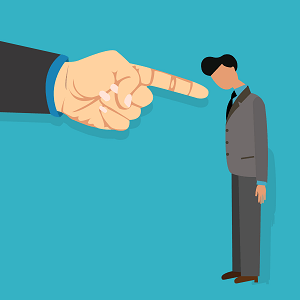The ABA Journal report that Big firms have long been reticent to openly address addiction and other mental-health problems, despite research showing lawyers face higher rates of substance abuse, depression, and suicide than the wider population,” the article says. “Law firm leaders say the need to keep up appearances in a competitive industry has contributed to the resistance. That attitude, however, is slowly changing. Read the article.
Big Law Tackles Mental Health Crisis Issues With On-Site Programs; Is Its Business Model at Fault?
Finding Motivation Even Through the Apathy of Depression
From Esperanza magazine, blogger Margaret Lanning writes, “Lack of motivation is probably the most difficult part of depression I continue to wrestle with. Trying to figure out how to get up and get moving is extremely challenging. It can make or break a day. When I feel apathetic, my senseless thought cycle starts with the notion that I need to choose to do something (clean the kitchen). Then comes immediate resistance (I don’t want to clean the kitchen), then the guilt trip (good mothers clean kitchens so the family can be healthy), then the compromise (I can have a bite of chocolate if I clean the kitchen), then the shut-down (but I still don’t want to clean, and I’ll probably eat the whole chocolate bar), then the self-punishment (I am a bad person because I’m still sitting here).” Read the blog.
Inside the Los Angeles Clinic That Uses Ketamine to Treat Depression
From LA Magazine. Advocates are hailing ketamine therapy and its attendant hallucinations as the ultimate brain hack. Prominent doctors and even the stodgy National Institute of Mental Health have championed the treatment as a powerful weapon in the battle against depression, one that could potentially prevent people from taking their own lives. Read the article.
The Strategies That Science Actually Shows are Effective for Depression
From Forbes magazine. As most people who have dealt with depression know, good treatments are hard to come by—but they do exist. Part of the issue is that a given treatment may work for one person and not the other, and it may take several tries before the right therapy, or a combination of therapies, is arrived upon. Here are some of the methods that have been shown to work, and are worth considering. As always, finding a therapist you trust and connect with is often the first step to figuring out which route to take. Read the article here.
Depression Undercover: A Trial Lawyer’s Secret
Once upon a time, I was a trial attorney at a personal injury defense firm. I was good at it. I always pushed hard; always did the best job possible. I won a good share of cases, and, of course, lost a few as well. I was valued highly enough to be made a partner shortly after joining the firm.
But I had a dirty little secret. I had bipolar disorder, which was well-controlled through a close partnership with a good psychiatrist. Still, in my mind, if word ever got out, my employers would see me as weak, a liability. To a degree, I understood. If the insurance companies that paid the bills learned that one of the firm’s trial attorneys had such a condition, their mandate would be clear: if you want our business, get rid of him. That is what I assumed.
Throughout my career, colleagues would make offhanded remarks about someone “not taking his medication.” I would grit my teeth and ignore it.
Instead, I was able to construct an alter-ego, the “happy warrior.” I had a smile on my face and a sardonic remark ready on cue. But I went about my daily business feeling like a secret agent in a Cold War spy movie. If my cover was ever blown, I was certain that my career would be at an end.
Over time, maintaining this secret identity while dealing with the usual strains of trial practice gave rise to a growing depression. Yet I still performed at a high level and still got results.
Although I had a close friend at the firm, another partner, he would deflect when I tried to talk to him about my depression, so I stopped. I began to worry that others at the firm might know about me.
Fear and the sense of isolation only fed upon themselves in a continuous cycle. I finally experienced a severe episode of depression that led to a period of disability. When I told my boss what was going on, he expressed genuine surprise that I was suffering from depression at all.
When I returned to work, I felt better, but I remained wary. Instead of engaging in a conversation about what had happened, we all acted as though nothing had occurred. The computer was rebooted, and business continued on as usual. I went back undercover, and no one seemed to mind.
Simply due to scheduling conflicts and adjournments, it was some time before I tried another case. I admit that I was a little nervous, but I was having no trouble handling my case load. I was puzzled when my boss came into my office one afternoon as I was preparing for the trial. He asked me if I felt good to go. He had never done that before. I said, “yes,” because I felt perfectly up to the task. I never asked myself, “If he is worried about my performance, why is he even letting me try the case?”
At trial, the insurance company sent an adjuster to audit the proceedings, a routine procedure. I knew him well, and he had an excellent grasp of the case, even though he had not been involved before trial. We had constant discussions about what was going on, and we seemed to be in sync. Suddenly, the insurance company pulled my old friend off the case and replaced him with a mid-level manager who consistently praised my performance.
The case went to verdict, and the jury awarded somewhat less than what the insurance company had offered settle for. To preclude the possibility of an appeal, the insurance company threw in a few more dollars. Case closed, on to the next one. To me, that was a pretty good result.
Was I in for a big surprise.
Shortly after the trial, year-end reviews were scheduled. I was getting ready for another trial, and I was very excited about it, so I wasn’t really paying attention to what was going on in the office. Other attorneys were getting their reviews – important because raises would be discussed – but I was never called in.
Ultimately, my case settled after much hard work on all sides, and the usual time for reviews was long past. I did start to worry then. I even made a remark to my secretary about it.
The call finally came. When I stepped into the conference room and saw every equity partner in the firm waiting for me, I knew. The spy had been caught, but what would happen?
My boss said that they waited to speak with me because they did not want to put pressure on me while I was preparing for another trial. He asked me if I felt capable of trying cases. I paused and then broke under the years of strain. I wept, and answered, “No.” Whether that “No” was true then or true now or was ever true, it was the most humiliating moment of a 20-year career.
My boss started to dissect my prior trial, telling me that the insurance company’s representative was reporting that I was doing a bad job. He even told me that the supervisor at the insurance company knew that I had depression. After the expected awkward silence, another partner suggested that “we find a creative solution” to keep me at the firm. I made some suggestions over the next few months. No replies were forthcoming. I was quietly being swept out the door. It wasn’t hard to get the message. I found another job and moved on.
The whole experience seemed to confirm everything I feared about being a lawyer with depression. Currently, I am not practicing, and am seeking other opportunities.
But if the story ends there, what is the point? Can I offer my account as a teaching opportunity? At the very heart of the tale lies the sad truth that we, as lawyers, trained to be superlative communicators, can utterly fail to make each other understood when it comes to depression. Should I have been more candid about my condition? My employers never told me what concerns they had or what they knew. Could all of us have been proactive for our mutual benefit, especially after I returned to work? I believe that there had been an opportunity to open a constructive dialogue, but my fear told me to keep my mouth shut. I cannot speak for my former employers, although I highly doubt that they held any malice. I doubt that they thought much about it at all until some critical pressure was brought to bear, whether from within or outside of the firm. Unfortunately, by the time everyone was talking, my job at a firm I loved was gone.
I miss working there. I still have close friends there. I see them when I can, which is not often enough. Just recently, I ran into my secretary, and we briefly chatted about my plans for the future. And then she said something that cut me to the quick: “You were a good lawyer.”
— Anonymous guest blog
Wiring of ‘Little Brain’ Linked to Multiple Forms of Mental Illness
Having a single mental illness like anxiety, depression or schizophrenia is hard enough on its own. But studies consistently show that up to half of people with one mental illness also experience one or more additional forms of mental illness at the same time.The high numbers of patients who suffer from multiple forms of mental illness has many researchers shifting focus away from studying individual disorders and instead hunting for common mechanisms or risk factors that might cause all types of mental disorders. Read the rest of the news here.
How Untreated Depression Contributes to the Opioid Epidemic
The Atlantic reports: “Several researchers now believe depression, one of the most common medical diagnoses in the U.S., might be one underlying cause that’s driving some patients to seek out prescription opioids and to use them improperly. People with depression show abnormalities in the body’s release of its own, endogenous, opioid chemicals. Depression tends to exacerbate pain—it makes chronic pain last longer and hurts the recovery process after surgery.” Read the rest of the story here.
Diet and Depression: Is There a Link?
U.S. News & World Report states, “If it’s true that ‘you are what you eat’ – and research is increasingly confirming that truism – then what you eat certainly has an impact on mental health. Finding a direct link between certain foods and the prevention or treatment of depression is hard, however. A cause-and-effect relationship “is a hotly debated issue,” says Dr. Steven C. Schlozman, assistant professor of psychiatry at Harvard Medical School. Read the rest of this news article here.
Five Simple Tips for Physical Activity While Fighting Depression
Researchers have found that routine physically activity can help reduce depression. When you’re physically active your brain releases chemicals that help relieve stress, promote alertness, and improve your overall mental well-being.That said, becoming more physically active while fighting depression can seem daunting. Here are some simple tips to get you started and keep you going. Read the rest of this blog.
Shame: The Other Emotion in Depression and Anxiety
Psychologists have identified anywhere between 6 and 10 basic emotions experienced by humans. It will come as a surprise to no one that the primary emotion in depression is sadness and in anxiety fear. In all those case, feelings of sadness and fear combine to form a stew of toxic emotions. Read the rest of this blog.
Built by Staple Creative











